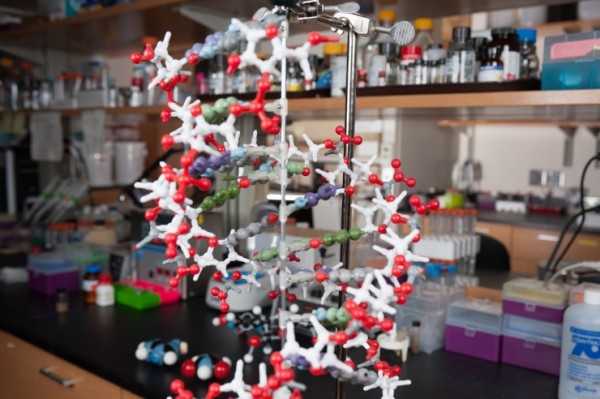By Ana Verayo, | April 27, 2016

A model of a long helix similar to RNA. After chemists produced momoners closely resembling the building blocks of RNA in easy, highly productive reactions, the resulting proto-nucleotides spontaneously joined up into long polymers that even look like RNA
Scientists have always explained that life on Earth began by some massive cosmic event such as a giant asteroid that crashed into the planet. However in this new study, scientists were able to pinpoint the origin of life on Earth and it all began in a nondescript puddle of water.
Like Us on Facebook
Instead of some fiery lightning strike or cosmic sprinkling of supernova dust, smaller pools of water became the first home of the planet's first living molecules, according to this new research. Researchers from the NSF NASA Center for Chemical Evolution revealed in a simple laboratory test that it is possible to generate the missing links to build RNA or the building blocks of life, with only the use of water.
New findings also suggest that these unique conditions to create this primordial soup only distinct to Earth is not even extremely rare but was rather conducive from the early universe's chaotic state. Scientists also believe that this was more abundant than first thought.
Researchers now suggest that the basic ingredients for life are probably more easier to concoct that previously expected, however, this new study can provide crucial insight in the understanding of the probability of life existing somewhere else outside the solar system.
During the experiments, researchers examined a pair of chemical predecessors of compounds derived to produce RNA which is a close relative of DNA. Since both are very similar to each other, researchers believe that RNA based life forms are the ancestors of DNA using organisms, where these RNA life forms are also preceded by another proto RNA.
With the combination of these two chemicals, scientists were able to form these supposed building blocks of life known as "proto nucleotides" that are highly similar in RNA which could be also be the first form of proto RNA. Results reveal surprising reactions since this combination generated life faster than previously expected.
According to lead author of the study, Nicholas Hud from the Georgia Institute of Technology, these two ingredients were probably most abundant during Earth's infancy, which are well suited for primitive information coding, suggesting that these are both already existing at that time to create the first life forms.
The possibility of discovering about the ancestors of RNA and DNA are now closer than ever before, as this can open up a new way of understanding the earliest emergence of life on Earth and how these first molecules appeared, including the way life looked like during the early stages of Earth.
This new study is published in the journal, Nature Communications.
-
Use of Coronavirus Pandemic Drones Raises Privacy Concerns: Drones Spread Fear, Local Officials Say

-
Coronavirus Hampers The Delivery Of Lockheed Martin F-35 Stealth Fighters For 2020

-
Instagram Speeds Up Plans to Add Account Memorialization Feature Due to COVID-19 Deaths

-
NASA: Perseverance Plans to Bring 'Mars Rock' to Earth in 2031

-
600 Dead And 3,000 In The Hospital as Iranians Believed Drinking High-Concentrations of Alcohol Can Cure The Coronavirus

-
600 Dead And 3,000 In The Hospital as Iranians Believed Drinking High-Concentrations of Alcohol Can Cure The Coronavirus

-
COVID-19: Doctors, Nurses Use Virtual Reality to Learn New Skills in Treating Coronavirus Patients







